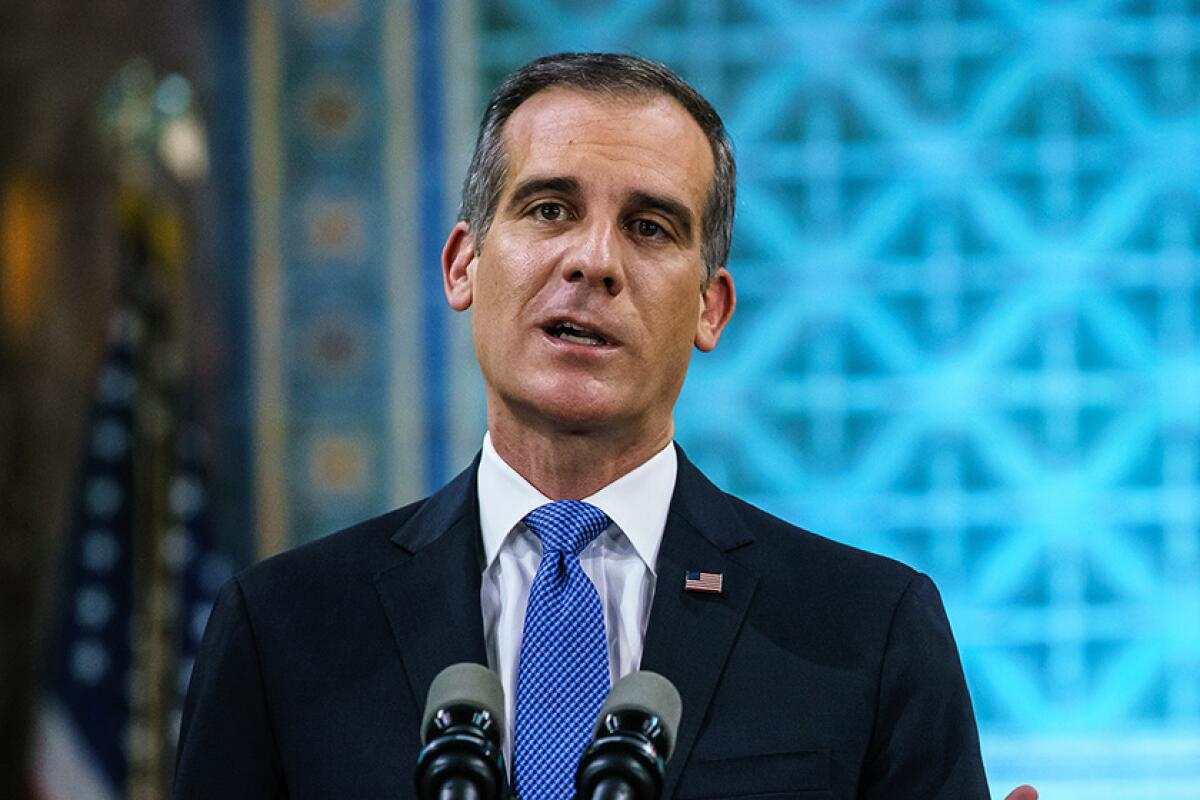To get through its budget crisis, L.A. could postpone paying some of its bills

- Share via
The financial crisis at Los Angeles City Hall has become so serious that city officials have begun looking at the possibility of pushing the payment of certain bills into the next fiscal year, according to a report issued Friday.
City Administrative Officer Rich Llewellyn, the city’s top budget official, said his office has asked each city department to prepare a list of contracts with payments due in the last three months of the fiscal year, which ends June 30, to determine which ones could be deferred until after July 1.
“Further, if a department believes that they cannot defer all or part of the payment, we asked them to justify the need to make the payment at this time,” he wrote in his 47-page financial report.
A report issued Friday by City Administrative Officer Rich Llewellyn, the city’s top budget official.
Llewellyn’s report comes as officials are working to close a massive budget gap, which grew to $750.7 million in recent weeks after Mayor Eric Garcetti and City Council members failed to secure sufficient short-term financial concessions from their public employee unions.
Budget officials said Friday they do not yet know how much could be saved by postponing payment of certain bills. They also said deferrals would not be considered for contracts with the city employee unions.
According to Friday’s report, each city department has been asked to show why those “contractual payments” must be paid on schedule. For example, certain payments might be needed to avoid late fees, preserve a financial discount or because nonpayment would cause “significant harm to a local small business,” the report said.
Asked about the deferral strategy, a spokesman for Garcetti said L.A. is facing the most difficult budget year in its history — with officials “leaving no stone unturned” while looking for savings.
“That means, as it has in past economic downturns, working with our contractors to explore options for deferring payments into next fiscal year, when we expect the economy and revenues to improve,” said Alex Comisar, a Garcetti spokesman.
Comisar said Garcetti will also continue seeking relief from Washington to “help states and cities balance their budgets.”
The mayor and council have already taken a number of steps to address this year’s budget shortfall, setting the stage for “deficit borrowing” — taking out $150 million in loans to pay for ongoing expenses — and draining as much as $274 million of the city’s reserves.
The latter move would leave the city’s reserve at its lowest level since the city’s last financial crisis, roughly a decade ago.
With less than five months left in the budget year, Garcetti and the council still need to find another $77.5 million in cuts or additional revenue to balance the books, according to Friday’s report. Complicating matters, many of the tools they used in the last recession won’t be available.
‘Super Bowl parties do have the power to derail our recovery,’ Los Angeles County Public Health Director Barbara Ferrer said this week.
To persuade the city’s employee unions to give up certain raises, Garcetti and the council abandoned their strategy for imposing furloughs, or unpaid days off, on portions of the workforce.
As part of those agreements, Garcetti and the council also promised not to lay off workers during the current fiscal year or make cuts to key services, such as firefighter staffing. In December, Llewellyn had suggested that as many as 1,900 layoffs were needed to balance the budget.
With fewer options at their disposal, city officials are now looking at eliminating Garcetti’s parking amnesty program, which provided a discount to motorists who paid parking tickets early, and tapping more of the city’s unspent federal COVID-19 relief funds, among other items.
Ben Ceja, assistant city administrative officer, said budget analysts will present their proposals for closing the $77.5-million gap in coming weeks.
Ceja said council members asked the city’s budget office in December to look at deferring certain payments. At the time, they also instructed the city’s budget team to look at postponing the payment of membership dues with such organizations as the U.S. Conference of Mayors and the League of California Cities.
Budget officials have recommended dropping that idea, saying it would simply result in the payment of two years of dues in 2021-22.
More to Read
Sign up for Essential California
The most important California stories and recommendations in your inbox every morning.
You may occasionally receive promotional content from the Los Angeles Times.












